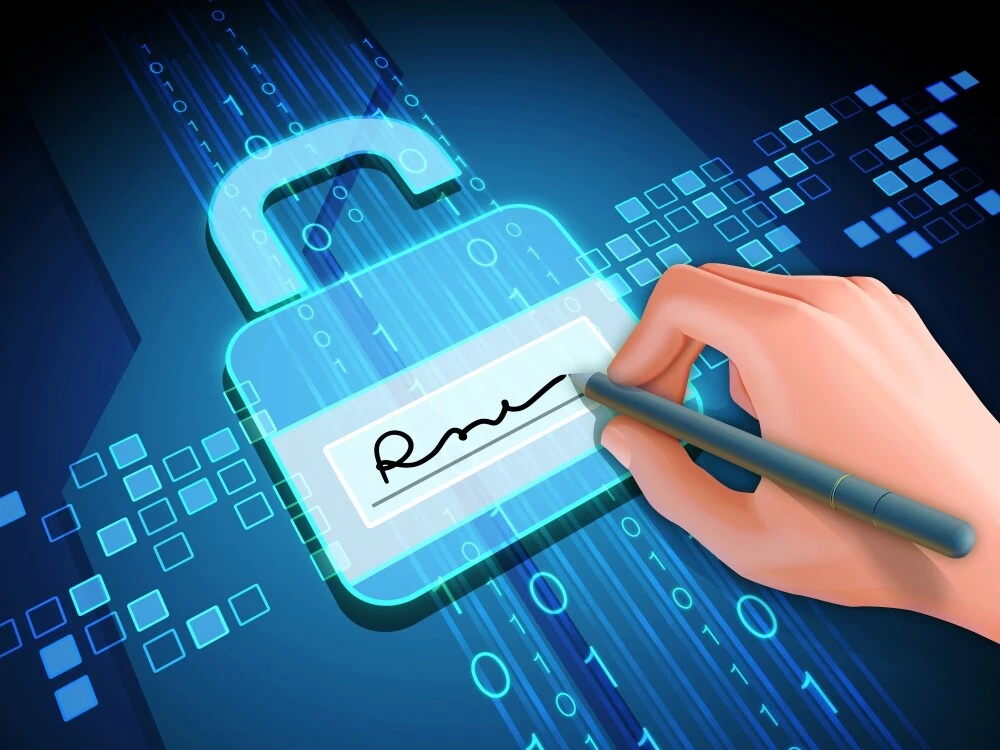What is digital signature? Is digital signature required?

Digital signature is currently a matter of great concern to businesses, especially in the implementation of online procedures such as tax declaration, social insurance … So what is a digital signature? Is digital signature required? How to use digital signature? The following article will answer some issues related to digital signatures that you are interested in.
1. What is a digital signature? What is digital signature?
“Digital signing” is the introduction of a secret key into a software program that automatically generates and affixes a digital signature to a data message.
“Digital signature” is a form of electronic signature created by the transformation of a data message using an asymmetric cryptographic system, whereby the person who obtains the original data message and the public key of the signer can be accurately identified.
In which, the data message transformation is generated with the correct private key and corresponds to the public key in the same key pair, the integrity of the data message content since the above transformation is performed. .
2. Legal value of digital signature
Where a document requires a signature by law, the requirement for a data message is considered fulfilled if the data message is signed with a digital signature and the digital signature is secure. according to the provisions of Article 9 of Decree 130/2018.
In cases where the law requires a document to be stamped by an organization, that requirement for a data message is considered fulfilled if the data message is signed by a digital signature of the agency or organization. and that digital signature is secured according to the provisions of Article 9 of this Decree.
Foreign digital signatures and digital certificates licensed for use in Vietnam under the provisions of Chapter V of this Decree have the same legal validity and validity as digital signatures and digital certificates issued by service providers. authentication of public digital signatures issued by Vietnam.
3. USB digital signature?
The structure of a digital signature consists of two parts:
Hardware – like a USB (called a USB token) and secured with a password or PIN;
A digital certificate is an integral part of a digital signature, containing all encrypted data of an enterprise.
4. Function of digital signature
Using digital signatures to conduct electronic transactions where the law allows the use of digital signatures.
- Digital signatures are used to declare, submit declarations, pay financial obligations in the fields of tax, customs and securities transactions, etc. When businesses use digital signatures in electronic transactions, they do not have to print them. return the declarations and stamp them;
- Enterprises that carry out business registration procedures such as changing business registration, notifying changes, establishing branches, representative offices, business locations, etc. can also use digital signatures to sign directly on documents, simplifying administrative procedures;
- Digital signatures are also used when businesses sign contracts with customers and partners online without having to spend time traveling or meeting.
The use of signatures will help to quickly exchange information and data, easily carry out online procedures and electronic transactions while still ensuring legal and high security.

5. What information does a business’s digital signature encrypt?
Contents in the enterprise digital signature will include the following information:
- Business information includes: Company name, Tax code, ….
- Number of digital certificate (serial number)
- Validity period of digital certificates
- Information about the name of the organization certifying the digital signature
- Digital signature of the organization certifying the digital signature.
- The letter restricts the purpose and scope of use of the digital certificate.
- Limitations on the responsibility of the organization providing the digital signature certification service.
- Other necessary contents as prescribed by the Ministry of Information and Communications.
6. Are businesses required to use digital signatures?
There are no regulations forcing businesses to use digital signatures in their business activities.
According to Clause 3, Article 26 of the Enterprise Law 2020, organizations and individuals have the choice to use digital signatures in accordance with the law on electronic transactions or use their business registration accounts to register their businesses via email. electronic information network.
However, in some special cases, enterprises must use digital signatures, specifically:
– Electronic signature in accordance with the law of the seller; date, month and year of making and sending invoices. Electronic signature as prescribed by law of the buyer in case the buyer is an accounting unit (Point e, Clause 1, Article 6 of Circular 32/2011/TT-BTC)
– E-invoices when buying and selling goods and providing services, when using e-invoices, must have a digital signature (Clause 2, Article 3 of Decree 119/2018/ND-CP).
– Taxpayers conducting business activities in areas with information technology infrastructures must declare, pay taxes, and conduct transactions with tax administration agencies via electronic means in accordance with regulations of law. Law (Clause 10, Article 17 of the Law on Tax Administration 2019)
7. What transactions does a digital signature help businesses perform?
Digital signature is a means to help businesses:
– Online tax declaration: In the Tax Administration Law, it is clearly stated that businesses based in provinces or cities with sufficient information technology infrastructure must make tax declarations via the internet. Digital signatures will help businesses replace manual signatures and legalize the tax declaration process. It can be understood that, without a digital signature, a business cannot declare taxes online because there is no method of verifying the identity of the business.
– Sign valid e-invoices: based on the guidance of the Ministry of Finance on e-invoices, the contents of e-invoices include: electronic signature of the seller, date, month and year of making and sending the invoice single; electronic signature of the buyer in case the buyer is an accounting unit.
Thus, e-invoices must be signed by the seller. Businesses need to use digital signatures to properly sign invoices.
– Declaration of electronic social insurance: businesses that want to declare social insurance electronically need a valid digital signature. A digital signature helps the competent authority to identify the person making the declaration and assign legal responsibility to that declarant.
8. Confidentiality and safety of digital signatures?
The most common form of digital signing today is signing via USB Token with a key pair. Therefore, businesses can be completely assured that information will not be falsely signed or stolen.
However, businesses should not be subjective when using the service. Some substandard providers can put businesses in trouble with the security of digital signatures. Enterprises should learn, consider and choose reputable suppliers in the market.

9. Cost of buying digital signature
Individuals and organizations can purchase digital signatures from digital signature agents of VIETTEL, FPT, BKAV, CK, VINA, NEWTEL, NACENCOMM, SAFE-CA… These suppliers are allowed to provide digital signatures for businesses. business in accordance with the law.
The cost of using digital signatures ranges from 02-03 million VND/year (depending on the price of the provider and the time of use).
Above are the contents of consulting and sharing about the digital signature of Khoa Tin Law.
In case customers have unclear issues or need to discuss further, please contact us at phone number 0983.533.005 for a free consultation.
Latest news










